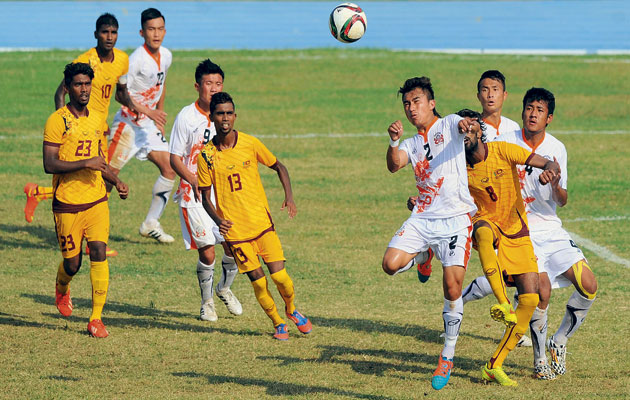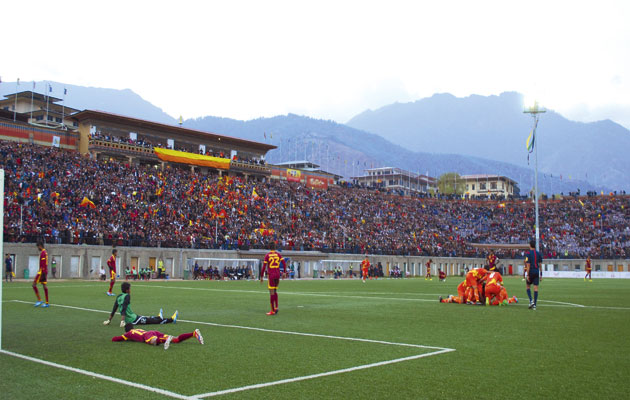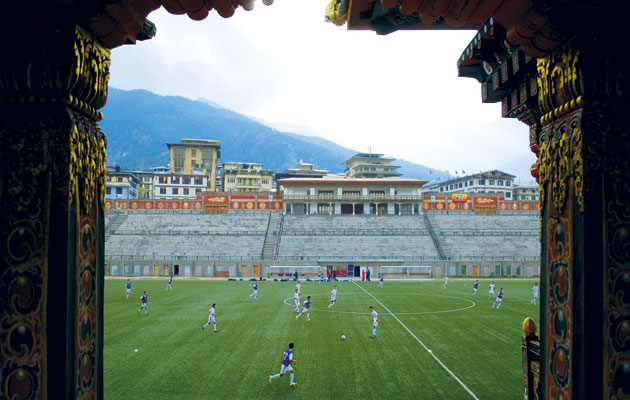For a city of 5.6 million people choked by a perennial mix of traffic, smog and noise, the Sri Lankan capital of Colombo was eerily and uncharacteristically silent and still.
The tuk tuk pottered through the city’s empty streets towards the Sugathadasa Stadium as the sun began to set on another blisteringly hot day.
In a few days, the long road to the 2018 World Cup finals in Russia would begin here and in five other cities across Asia near simultaneously. Sri Lanka were due to play Bhutan, the world’s lowest-ranked team according to FIFA. But the country’s excitement had been exhausted by another World Cup.
The streets of Colombo had emptied for a Cricket World Cup match between Sri Lanka, who won the competition in 1996, and Australia. Down side streets, groups of teenagers played impromptu street cricket, using upturned wooden boxes or plastic crates as wickets.
Sitting inside the deserted Sugathadasa Stadium, Nikola Kavazovic is well used to football taking a back seat to Sri Lanka’s national game. He had been waiting for an interview with one of the few newspapers who had expressed an interest in the game. The journalist had yet to turn up. “This is the most important match ever for Sri Lanka,” he said with a shake of his head.
“I didn’t expect people, fans or anyone else to support this national team. I was prepared that we would not have any support. Unfortunately I was right.”

After a successful spell with Tajikistan, Kavazovic was appointed coach of Sri Lanka in 2014 and was charged by the country’s football federation with taking the team past the first round of qualification, where 12 of Asia’s lowest-ranked teams were drawn against each other in home and away ties.
The winners would qualify for a group stage and the chance of playing eight competitive matches against Asia’s best teams – a bonanza for countries on the edges of the international game who can sometimes go a whole year without playing a meaningful match.
Being matched with Bhutan – an isolated kingdom in the Himalayas not only considered the worst team in the world by FIFA but also one playing its first-ever World Cup match – was considered as good as being handed a bye for many.
“Two matches against Bhutan and we can change the history of Sri Lankan football,” states Kavazovic, although he had no illusions about qualifying for Russia. Reaching the group stage, not finishing last and improving Sri Lanka’s chances of qualifying in future tournaments were more realistic goals.
“I told them once ‘Boys, this is do or die’ ,” he recalls. “If we win [against Bhutan] you are going to play against Dejagah, Honda, Cahill, a legend of Australian football. Otherwise you will only play the South Asian Cup [the South Asian Football Federation Championship, played every two years]. And I think you are sick of South Asian Cup.”
Kavazovic knew almost nothing about the Bhutan team aside from a few matches on YouTube. “Chencho is an excellent striker,” he said of Chencho Gyeltshen, a raw, 18-year-old player who had played a few games for reigning Thai champions Buriram United. “He’s the only guy I know.”
The Serb coach had come in with a far stricter way of doing business than the Sri Lankans had been used to in the past. “Flexible communism. Everyone is equal. I’m the first against equals,” he says when asked to describe his coaching style.
Earlier, the team’s general manager had wondered how he was going to break the news to the coach, without getting his head ripped off, that the only way of getting to Bhutan now was via four flights over 24 hours. The tickets had yet to be booked and the match is less than a week away. “Sometimes they are afraid of my reactions because I’m Slav,” he laughs.
“My temperament is sometimes very bad.”
But the Sri Lanka players didn’t appear cowed or fearful, but rather relaxed and confident. After training the team presents a cake for one of the player’s birthdays, their striker Sanjeev Shanmugarajah. As he approached he was squirted in the face with whipped cream, as others smeared chocolate cake over his face.
“All countries dream of the World Cup,” he says confidently through a wide smile, cake still smeared on his face. “We are planning a 4-0 score.”
Meanwhile, Bhutan arrive a few days before the match in surprisingly good condition. In fact, Bhutan very nearly didn’t take part in the qualifying competition at all. In December the Bhutan Football Federation had ruled out entering, preferring instead to use their small resources to improve their youth-training set-up.
But early in the new year FIFA announced that $300,000 would be made available to help with the substantial cost of moving a national team around Asia for two matches. The Thai FA then offered their facilities for training. The Bhutan team had spent a month in Bangkok acclimatising to the heat and humidity while playing practice matches against top Thai teams, even beating a few of them.
“A few of the boys were sick on the first day,” said Bhutan’s captain Kharma Shedrup Tshering of the intense first week of training. While almost all the other players were still asleep, he is sat in the team’s hotel on Colombo’s tropical seafront with the side’s 45-year-old coach Chokey Nima.
Several of the players are outside of their own country for the very first time too, but Tshering is used to leaving Bhutan every week. As well as being the national captain, he is also a pilot for the national airline, Druk Air. “When we get back to Bhutan, next day I fly to Bangkok and back,” he says. “Then we play Sri Lanka and then the next day I fly to Singapore. We have a shortage of pilots right now.”
Bhutan is a landlocked country of three quarters of a million people in the eastern Himalayas that has been largely isolated from the rest of the world until now. Few flights land at its picturesque Paro Airport, and tourists have to pay a minimum $250 a day tariff each to stay in the country.
Television was banned until the late 1990s and older members of the federation, including Nima, remember those days before TV, when VHS cassettes of European Cup matches and World
Cups were smuggled in. Nima played for the Bhutan national team for 12 years and was part of the side that lost 20-0 to Kuwait in an Asian Cup qualifier in 2000 – a world record defeat at the time. Bhutan conceded four penalties and had two red cards. “Spending 90 minutes on the pitch was pretty tough,” he recalls. “We were not aware of tactics.”
Shortly afterwards Bhutan joined FIFA, but it is television that has completely revolutionised the game. Nima believes that his players are better at almost every level than when he played. “At the individual level, the psychological, tactical and physical level,” he says. “In football we see how things are done. We are much, much better than we were before. We have much more exposure to TV and experienced coaches.”
Tshering can’t remember a time before TV and adds: “The first match I remember was France 1998, so my favourite player was Zinedine Zidane. Television was a great influence for me. Television really helped me to play the way I do now.”
Although results against professional league teams in Thailand had given Bhutan hope, the big test would come against Sri Lanka. But Tshering seemed put out that they had been dubbed the “worst team in the world”, believing that their ranking was a false position. “We have a lot of talent, but Bhutan is
a very landlocked country and not very open to the media,” he argues. “But if we do qualify it will help these young players to maybe move abroad. This game will go down in history.”

And indeed it did. The Sugathadasa Stadium was virtually empty as the two national anthems were played. The Sri Lanka federation had hoped a few thousand would attend, but kick-off was arranged for 3pm on a workday, a ruse to give the team an advantage in the heat.
Once again cricket intervened, but not the World Cup this time. A famous school cricket match, the second oldest in the world, was starting that day and 30,000 fans were expected across town. Only
a few hundred had arrived to see the national football team play, most of them Bhutanese students who had travelled from across the country to be there.
On the morning of the match the Bhutan team hotel was abuzz with comments from a former Sri Lanka captain that seemed to denigrate the visitors, and when the match began Bhutan came flying out of the blocks.
It was clear within a few moments that Bhutan were far better than their ranking suggested. Not only did they seem fitter in the sweltering afternoon heat that was supposed to give Sri Lanka a huge advantage, technically they had the upper hand too. Chencho, the player picked out by Kavazovic before the game, terrorised Sri Lanka’s defence with his pace, and although the first half ended goalless, both teams hit the woodwork.

Chances came and went in the second half as the two teams inevitably tired, but Bhutan always looked the more likely to score. And, with a few minutes left, they did exactly that.
Chencho flew down the wing, cut the ball back and midfielder Tshering Dorji scored the goal that secured Bhutan’s first-ever World Cup victory. The players celebrated wildly on the pitch while the
Sri Lanka players sullenly walked back to the dressing room as the result made headlines around the world.
Later that night, the team went to celebrate at KFC, where the total bill was $400. “There was too much chicken, I ordered a bucket for each player,” Bhutan’s general manager later recalls with regret. For the players who had never left the country it was their first taste of Western fast food. The next day the players gathered at Colombo Airport for the flight back to Bhutan via Bangkok. One of the players new to foreign travel tried to check two buckets of chicken in with his luggage.
When the Bhutan players landed in Paro, around 40km from the capital Thimphu, a welcoming party was waiting for them in traditional dress, holding banners and singing traditional songs.
The players sang as the team bus rollicked around the mountain roads towards the national stadium.
The victory had transformed the narrative around the Bhutan national team: from perennial hopeless losers they were now genuine possible victors and the next few days saw the country gripped by World Cup fever. Bhutan’s one TV channel beamed wall-to-wall coverage of the team. The federation sold out of national team shirts. The players visited monasteries and received blessings from monks in what
is a deeply Buddhist country. The squad settled back into their surroundings, 8,000ft above sea level, the thin air making the stunning Changlimithang Stadium the third highest in the world, and the highest outside of South America.
Conversely, Sri Lanka had endured a terrible journey, sleeping on benches at Indian airports. “The journey was very difficult, but we recovered fast,” says Kavazovic outside his team hotel before the return game. “We are in a bad situation. We made a mess in Colombo but we now have to fix this mess.”
Kavazovic said his players were feeling no ill effects of the altitude and were buoyed by the fact that the Chanlimithang Stadium had artificial turf. But he still had to take drastic measures to protect his players from the embarrassment of the first game. “I took all the mobile phones from the players so they can’t read any comments,” he explains. “But we can not be underdogs in this match. We are a better team than them.”

The Bhutan government announced that all civil servants would get the afternoon off to watch the historic second leg World Cup qualification match. Entry to the stadium would be free too. The Chanlimithang Stadium was full an hour before kick off as the country braced itself for the biggest day in its modern history.
A few hours beforehand, Bhutan’s captain Kharma Shedrup Tshering visited a nearby monastery to be blessed by a monk, pray and throw divination dice. The numbers were good, he was told. He would be fresh for the game too. After the victory in Colombo, Druk Air had wisely given their pilot the rest of the week off.
By kick-off, as many as 30,000 people had filled every space inside and outside the stadium. Within five minutes, it had erupted. Chencho had chased a hopeful long ball and somehow flicked it past the onrushing goalkeeper. Bhutan seemed on course for victory until Sri Lanka finally scored late in the first half. The game swung back and forth in the second with Chencho bursting through time and again. He had a goal disallowed before Sri Lanka hit the post with minutes left. A goal either way would have clinched progression. But, finally, the altitude told.
A tiring Sri Lanka couldn’t stop Chencho from weaving through its defence and firing home in the 90th minute.

Almost every Bhutan player was in tears when the final whistle was blown. From the lowest-ranked team in the world, they had won two matches in a row. They had only won four in their entire history before.
And what of Sri Lanka? Coach Kavazovic visited the Bhutan dressing room and congratulated the home side. He asked for Chencho’s shirt, the man, he joked, who just cost him his job.
“I can say, deep in my heart, I will cheer for Bhutan in the group stage,” admits Kavazovic after the game, with the crowd still deafening in the background. “Look at the crowd. They deserve this. This country deserves it more.”
Bhutan now move on to the group stage, where they will enjoy a huge advantage at home, in the altitude. “They heard The Dragon roar!” captain Kharma Tshering says on the pitch as the players celebrated around him.
But there would be no celebrations at KFC this time, as KFC doesn’t exist in Bhutan. Nor any drinks. Tuesday had been designated a dry day by the government. Instead, the players and their families met in a local hotel to eat and to cry a little.
“It feels amazing, but I haven’t thought about what happens next,” said Tshering in the lobby.
“But maybe,” he added, “it might help me get a girlfriend.”
By James Montague







